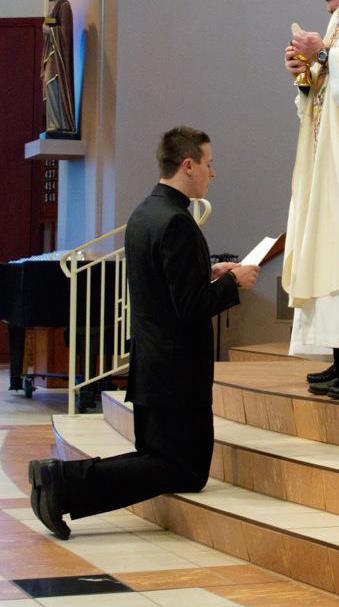 It had been a while since I had seen The Sound of Music so I was lucky when I got to see a bit of it on ABC Family the other day. Now that I’m older than when I originally watched it I can understand more the deeper themes of the story. It wasn’t long before I saw how much Ignatian spirituality could be found in it.
It had been a while since I had seen The Sound of Music so I was lucky when I got to see a bit of it on ABC Family the other day. Now that I’m older than when I originally watched it I can understand more the deeper themes of the story. It wasn’t long before I saw how much Ignatian spirituality could be found in it.
We first meet Maria Rainer, a postulant at an abbey in Salzburg, Austria. In the opening scene we find her singing The Sound of Music. Maria clearly finds God in all things. She escapes the confines of her cloistered life in the abbey showing that God is not just confined within the walls of a religious edifice. “The hills are alive with the sound of music, with songs they have sung for a thousand years.” Through the ages, God makes the mountains sing, singing to her heart. “My heart wants to beat like the wings of the bird that rise from the lake to the tree.” She goes to the hills to find God, to find companionship with God.
I go to the hills when my heart is lonely.
I know I will hear what I’ve heard before.
My heart will be blessed with the sound of music,
And I’ll sing once more.
This is her prayer. But she does not just sing. The lyrics say she listens and she’s blessed by what she hears. No doubt it’s a two-way conversation between her and God. And she seems to come back to this kind of prayer whenever she feels sad or lonely: “When the dog bites. When the bee stings.” She brings to mind all her favourite things, all those things in which she can easily find God like raindrops on roses and whiskers on kittens. It’s a nice reminder that God’s not so far away.
 But it seems Maria is a bit of a troublemaker in the abbey and not much liked by her sisters. She sings too much, she’s late, she’s a clown! Yet she makes them laugh. A tension exists: “She is gentle! She is wild! She’s a riddle! She’s a child! She’s a headache! She’s an angel!” They don’t know what to make of her. How do you solve a problem like Maria? Sounds like it’s time for some discernment!
But it seems Maria is a bit of a troublemaker in the abbey and not much liked by her sisters. She sings too much, she’s late, she’s a clown! Yet she makes them laugh. A tension exists: “She is gentle! She is wild! She’s a riddle! She’s a child! She’s a headache! She’s an angel!” They don’t know what to make of her. How do you solve a problem like Maria? Sounds like it’s time for some discernment!
To ensure Maria is ready for monastic life Mother Abbess sends her to be the governess of the seven children of Captain von Trapp. On the way there Maria is worried about what’s to come. Her heart is filled with fear and excitement, doubts and worries. But, in a very Ignatian move, she asks for the grace she is seeking: Courage. “I must dream of the things I am seeking. I am seeking the courage I lack. The courage to serve them with reliance. Face my mistakes without defiance.” It’s something she really needs to serve in the assignment given by her superior. Again we find a song that could very well be her prayer.
Much time goes by and Captain von Trapp’s lady friend, Baroness Schrader, becomes jealous of Maria’s presence so she tells Maria that the Captain is falling in love with her. Maria, as one who had hoped to enter the celibate life of the monastery, freaks out and rushes back to the abbey. She tells Mother Abbess what happened and that, maybe, she had feelings for him, too. The following exchange ensues:
Mother Abbess: Maria, the love of a man and a woman is holy. You have a great capacity to love. You must find out how God wants you to spend your love.
Maria: But I pledged my life to God. I pledged my life to his service.
Mother Abbess: My daughter, if you love this man, it doesn’t mean you love God less.
And then she sends Maria back to the von Trapp house to test her feelings and see if the love between them is something real (it ends up being so). The discernment is not over. “These walls were not built to shut out problems,” says Mother Abbess. “You have to face them. You have to live the life you were born to live.” This is a very Ignatian way of discernment. In the Spiritual Exercises, Ignatius says that someone making a major decision (like between religious life and lay life) should “try on” and test each option. In Maria’s case she has the opportunity to try out both lives fully. But if you can’t really begin to live one way of life fully you can pretend. Live as if you’ve already made one decision or the other. Then pay attention to your feelings.
Mother Abbess captures this search for God’s will in song:
Climb every mountain
Search high and low
Follow every byway
Every path you know
Climb every mountain
Ford every stream
Follow every rainbow
Till you find your dream
A dream that will need
All the love you can give
Every day of your life
For as long as you live
Whatever the dream is, whatever God’s will, it will need all the love you can give. So in the words of Mother Abbess, How does God want you to spend your love?
Now for Grover’s interpretation of The Sound of Music:
https://www.youtube.com/watch?v=J3-WxYq6f8w
This reminds me of 1 Kings 19 when Elijah was on the mountain waiting for the Lord. And the Lord was not in the wind, the earthquake, nor the fire; he was in a soft whisper.
Sometimes we, like Grover, sit waiting a very long time to hear God’s voice. For Grover it’s not in the sound of the sirens or the clucking of a chicken. The waiting is worthwhile and Grover finally hears the beautiful music of God’s voice, causing the hills to truly come alive! The music literally moves Grover. So I think the message for us is, Shhh, listen. If we listen patiently we give God the chance to move us, even to make us come alive with the sound of God’s music.
Auf Wiedersehen.









What a fabulous post!